-
 14 min. read
14 min. read
-
 Macy Storm
Macy Storm Senior Content Creator
Senior Content Creator
- Macy is a marketing writer with over five years of experience creating content for dozens of industries including food and beverage, home services, and education. She also specializes in creating SEO and PPC content. Her work has been featured by Search Engine Journal, HubSpot, Entrepreneur, Clutch, and more. In her free time, Macy enjoys trying new crafts and reading comic books.
Did you know that 70% of clicked results are organic? With so many people clicking on organic listings, you must utilize search engine optimization (SEO) to help you rank in these organic search results. As you research SEO, you’ll likely have numerous questions about this strategy and how it works.
In this post, we’ll cover nine common SEO questions you’ve asked and provide you with the answers to those questions. If you have additional questions about SEO, contact us online or call us today at 888-601-5359 to speak with a strategist about how our SEO process works.
Question: What are the different types of SEO?
Watch our video and then keep reading to find out.
Answer: There are two main types of SEO: on-page and off-page. Let’s look at the difference between these two types of SEO.
On-page SEO

On-page SEO refers to activities performed on your website that help you improve your ranking.
These are changes you can make to your site to help you rank better in the search results. Here are some on-page SEO strategies:
- Optimizing content: Your content is any information you publish on your company’s website. This content is part of on-page SEO because you can control your content and how you optimize it. You can optimize content by integrating keywords and matching user search intent.
- Optimizing meta tags: Meta tags are pieces of text that describe your page of content. Users won’t see these tags when they search, but these tags do appear in your site’s coding. Google will crawl the coding on your pages and read the meta tags to understand the context of your website better.
- Optimizing your page speed: Your site’s load time is an integral part of SEO because users don’t want to wait for slow-loading pages. By maximizing the backend of your website, you can improve your site’s load time and improve your SEO ranking.
Off-page SEO
Off-page SEO involves any action that you don’t do on your site but influences your ranking. You can’t control these factors, even though they impact ranking. Let’s look at a few off-page SEO factors.
- Social media shares: While social media engagement doesn’t directly impact your SEO, many marketers believe it contributes to improving traffic on your site. When you share pages on your social profiles from your website, you drive traffic to your page. This off-page SEO factor can help improve your SEO because you drive more credible traffic to your site.
- Earning backlinks: Backlinks are links to your website from other authority domains. If credible domains are linking to your content, it builds Google’s trust in your website’s validity and authority. You can’t force people to link to your content, but when other industry experts do, it helps improve your SEO ranking.
Question: Why are keywords relevant to SEO?
Answer: Keywords play a fundamental role in where your website’s listing appears in the search results. When users conduct searches, they use keywords to find listings relevant to their search query. You must target the right terms so you can reach people most interested in your business.
To find relevant keywords, you’ll conduct keyword research.
Keyword research will help you find the best keywords to integrate into your site and help you rank in the right search results. There are numerous keyword research tools you can use to help you find the right keywords for your campaign. Keyword research tools like BuzzSumo and KeywordsFX help you find the right keywords for your campaign.
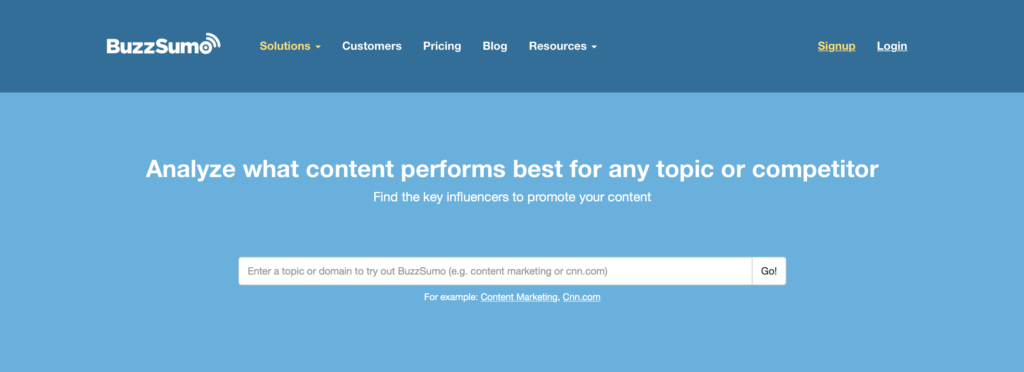
When you find the right keywords for your campaign, you’ll improve your SEO and appear in more relevant search results.
Question: What are long-tail keywords?
Answer: When you start optimizing for keywords on your site, you’ll find that experts recommend using long-tail keywords.
But what are long-tail keywords?
Long-tail keywords are keywords that contain three or more words. An example of a long-tail keyword is “HVAC companies in Harrisburg, PA.” This keyword is specific and shows user intent. It’s best to use long-tail keywords for your campaign because they drive the most relevant traffic to your page.
When someone searches “HVAC company in Harrisburg, PA,” you know what the user wants to find. They’re looking for an HVAC company in that particular city.
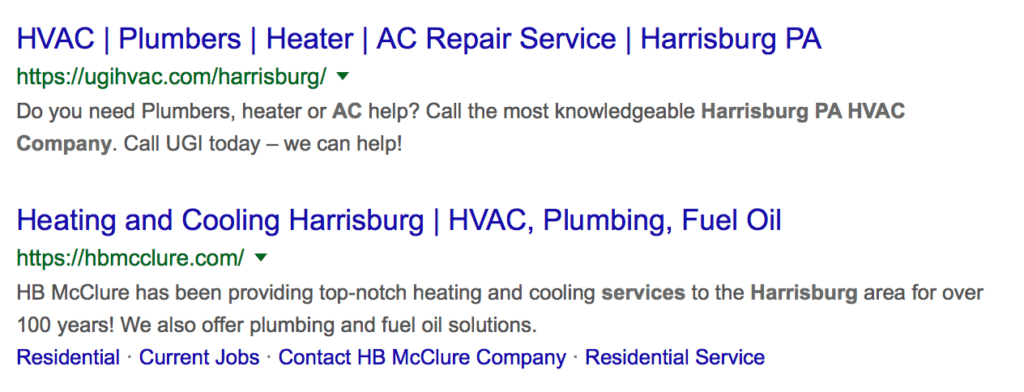
If someone searched with a short-tail keyword, like “HVAC,” you would have a harder time determining the search intent. Someone could search for an HVAC company, but they could also be looking for a definition of the acronym or how to become an HVAC repair person.
Long-tail keywords are a crucial component of SEO that allows you to rank higher in the search results. You’ll reach more valuable leads by integrating long-tail keywords into your SEO campaign.
Question: What does SERP mean?
Answer: One of the most common SEO questions people ask is regarding the acronym SERP. SERP stands for search engine result page.
When you perform a search on Google, you get a mixture of paid and organic listings.
All of these listings are part of SERPs. Essentially, it’s the page of listings displayed when you search.
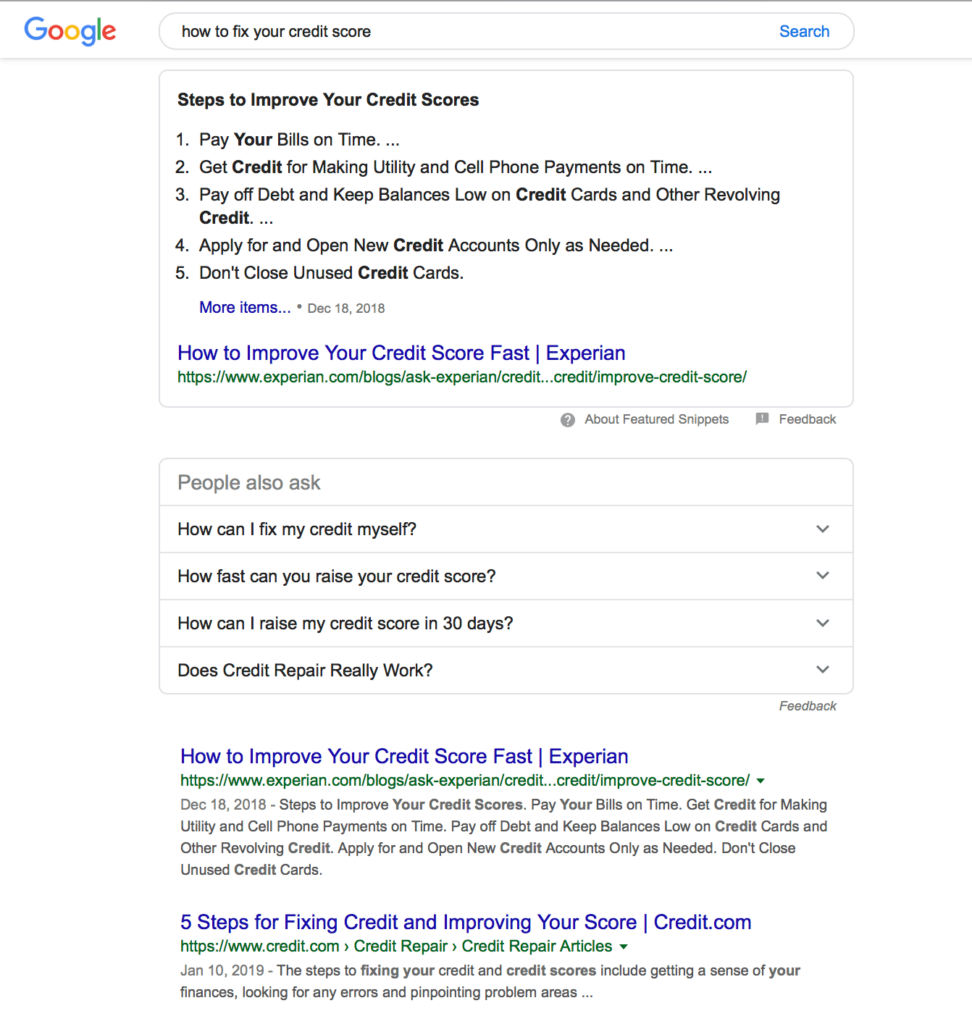
As you optimize for SEO, it’s essential to look at the SERPs for your keywords. You want to see who’s ranking in the SERPs and the type of content they’re putting out that’s allowing them to rank highly.
It’s a great way to help you optimize your strategy to outrank your competitors in the SERPs.
Question: What affects your SEO ranking?
We’ll explain in our video AND in this section of the text.
Answer: One of the most commonly asked technical SEO questions is, “what affects my ranking?” After all, if you’re going to do SEO right, you must know factors that can impact where your business appears in the search results. Factors include page load time, keyword selection, and more.
Let’s take a look at a few factors that influence your site’s ranking:
- Page load time: If your site loads too slowly, you risk losing leads to the competition. Your audience doesn’t want to wait for pages to load, and if your site takes too long, they will leave. This behavior increases your bounce rate, which negatively impacts your site’s ranking in the search results.
- Keyword selection: Keywords help your listings appear in the right search results. You must choose relevant keywords to ensure you appear in the right results. Having the right keywords will help you drive more interested traffic to your page, which will increase the time spent on your page and improve your site’s ranking
- Content creation: When your business creates content for your audience, you share your knowledge and expertise with them. Content marketing influences SEO because it helps drive traffic to your site and keep traffic on your site longer. The increase in dwell time, or time spent on your website, helps boost your ranking in the search results.
While many factors influence your SEO ranking, these three factors have a more substantial impact on your ranking. If you want to be successful with SEO, you must know what affects your ranking and how you can use these factors to improve your ranking.
Looking for an all-in-one SEO audit tool? You’ve found it.
SEO Checker provides data on key metrics to give you:
- Complete SEO score
- Content Grade
- Site Speed Analysis
- and more.

Question: What are inbound and outbound links?
Answer: One of the most common technical SEO questions, regards linking. Linking is a crucial part of SEO that helps improve your site’s ranking.
There are two types of links you’ll incur: outbound and inbound links.
Many people mix up these two types of links, so we’ll provide a little more detail for each.
Inbound links

Inbound links are links from another page to your page. These sites link to a specific page on your website that is related to information on their page. For example, let’s say you’ve written a page about how to set a monthly budget and you’ve included a downloadable budget calendar for your audience.
Another financial institution sees your calendar and decides to link to it in their article about financial planning. This link creates an inbound link, or backlink, for your site. Inbound links help you build your site’s authority.
If high-authority websites are linking to your pages, it signals to Google that your site is reputable and trustworthy. You’ll rank higher in the search results because your site is reliable, and users can trust the information on it.
Outbound links
Outbound links are links from your page out to other sources. You send people out to other pages by linking to content related to information on your page.
Many companies use outbound links as an opportunity to link out to other pages on their website. This practice is known as internal linking. Internal linking allows you to keep leads on your site longer, which increases dwell time and builds brand familiarity.
Outbound links are a great way for you to provide additional information for your audience. You’ll keep leads on your page longer and improve your SEO ranking.
Question: What are title tags and meta descriptions?
Answer: When asking technical SEO questions, many people reference to title tags and meta descriptions. These two elements are a crucial part of SEO and impact your site’s ranking.
Title tags
Title tags are the names of the pages you see in the search results.
 This tag is the first thing people see in the search results.
This tag is the first thing people see in the search results.
You must optimize this tag because it helps tell your audience the context of your page. Search engines use title tags to determine relevancy, too. If you have a well-optimized title tag, it will help your pages rank in relevant search results.
So, how do you create a well-optimized title tag? The first step is to include your keyword. You’ll want your target keyword to appear at the front of the title tag.
This positioning helps Google understand the context of your page and shows your audience that your page is relevant to their search query. A strong title tag tells your audience exactly what to expect when they click on your listing. Whether it’s a list of tips or how to do something, your audience should know what to expect when they click on your title.
This process will help you create a useful title tag that resonates with your audience.
Meta description
Your meta description is another essential part of your SEO listing. The meta description appears below the title tag. It’s a short blurb that tells your audience about your page.

Your meta description is just as important as the title tag.
After your audience looks at the title tag, they will read the meta description to get more information about your page. You must create a descriptive meta description that tells your audience what they can expect when they enter your site. You’ll want to include your keyword in this description, too, to help Google further understand the context of your page.
Having a strong meta description will entice more people to click on your SEO listing and check out your business.
Question: How do you create an SEO-friendly URL?
Answer: One of the most common technical SEO questions is how to create an SEO-friendly URL. SEO-friendly URLs are essential because they help search engines understand the context of your page better. It also makes it easier for your audience to remember.
If you want to have a URL that’s SEO-friendly, stay away from mixed letters and numbers.
 In this example, the middle part of the URL is a mixture of numbers and letters.
In this example, the middle part of the URL is a mixture of numbers and letters.
While the end of the URL becomes more SEO-friendly, the mix of numbers and letters will throw everything off. When your URL is a mix of letters and numbers, people won’t remember it. It’s difficult for users to remember the order, making it harder for users to return to your site.
Additionally, search engines won’t be able to get additional details about your page if your URL is random. Having an SEO-friendly URL makes it easier for search engines to read your site. To create a URL friendly for search engines, you’ll want to create one that is descriptive and tells your audience what to expect on the page.

In this example, the URL is clear and descriptive.
The URL is simple and tells the audience that they can expect to see DIY wedding flower arrangements. This example is an excellent instance of an SEO-friendly URL. If you want to have an effective SEO campaign, you must have an SEO-friendly URL.
Question: What’s the difference between white hat SEO and black hat SEO?
Answer: Asking about the difference between white hat SEO and black hat SEO is one of the most critical SEO questions that you will ask. To put it simply, white hat SEO is good and black hat SEO is bad.
White hat SEO
White hat SEO practices are positive practices for your business.
These are strategies that naturally help your website rank better in the search results. Most importantly, these strategies align with Google’s rules. Some white hat SEO techniques include:
- Keyword research and integration
- Improving page speed
- Creating content
- Matching user search intent
These white hat SEO techniques align with Google’s rules and help your site rank better in the search results. The critical thing to remember with white hat SEO techniques is they take time to show results. You won’t be able to climb to the top of the rankings overnight.
It takes time for Google to recognize your optimizations and adequately rank your site.
Black hat SEO
Black hat SEO techniques are untruthful SEO techniques. These techniques involve using practices that quickly boost your site’s ranking but also go against Google’s rules. Some black hat SEO practices include:
- Link farming
- Keyword stuffing
- Cloaking
Some SEO companies will use these practices to try and get top rankings fast. While it may seem tempting to get high rankings fast, it won’t last. Google will catch these corrupt practices and diminish any rankings you gained, which will hurt your website in the long run.
If you use black hat SEO techniques, you run the risk of ruining your site’s rankings and reputation. To avoid hurting your site’s ranking in the search results, avoid black hat SEO techniques, and stick to white hat SEO techniques.
Got any more important SEO questions?
If you have any more SEO questions, we’ve got SEO answers. Many moving parts go into SEO, so you’re likely to have more questions about this strategy.
Our team at WebFX can help answer any questions you have about SEO. We have a team of over 500 experts that will help you understand SEO and create a campaign that works for your business. If you’re ready to get all your SEO questions answered, contact us online or call us today at 888-601-5359 to speak with a strategist.
-
 Macy is a marketing writer with over five years of experience creating content for dozens of industries including food and beverage, home services, and education. She also specializes in creating SEO and PPC content. Her work has been featured by Search Engine Journal, HubSpot, Entrepreneur, Clutch, and more. In her free time, Macy enjoys trying new crafts and reading comic books.
Macy is a marketing writer with over five years of experience creating content for dozens of industries including food and beverage, home services, and education. She also specializes in creating SEO and PPC content. Her work has been featured by Search Engine Journal, HubSpot, Entrepreneur, Clutch, and more. In her free time, Macy enjoys trying new crafts and reading comic books. -

WebFX is a full-service marketing agency with 1,100+ client reviews and a 4.9-star rating on Clutch! Find out how our expert team and revenue-accelerating tech can drive results for you! Learn more
Try our free SEO Checker
Boost your site’s search performance with our free SEO Checker. Analyze your website for optimization tips on titles, headers, content, speed, and more. Get a free report now to enhance rankings on Google, Bing, Yahoo, and beyond!
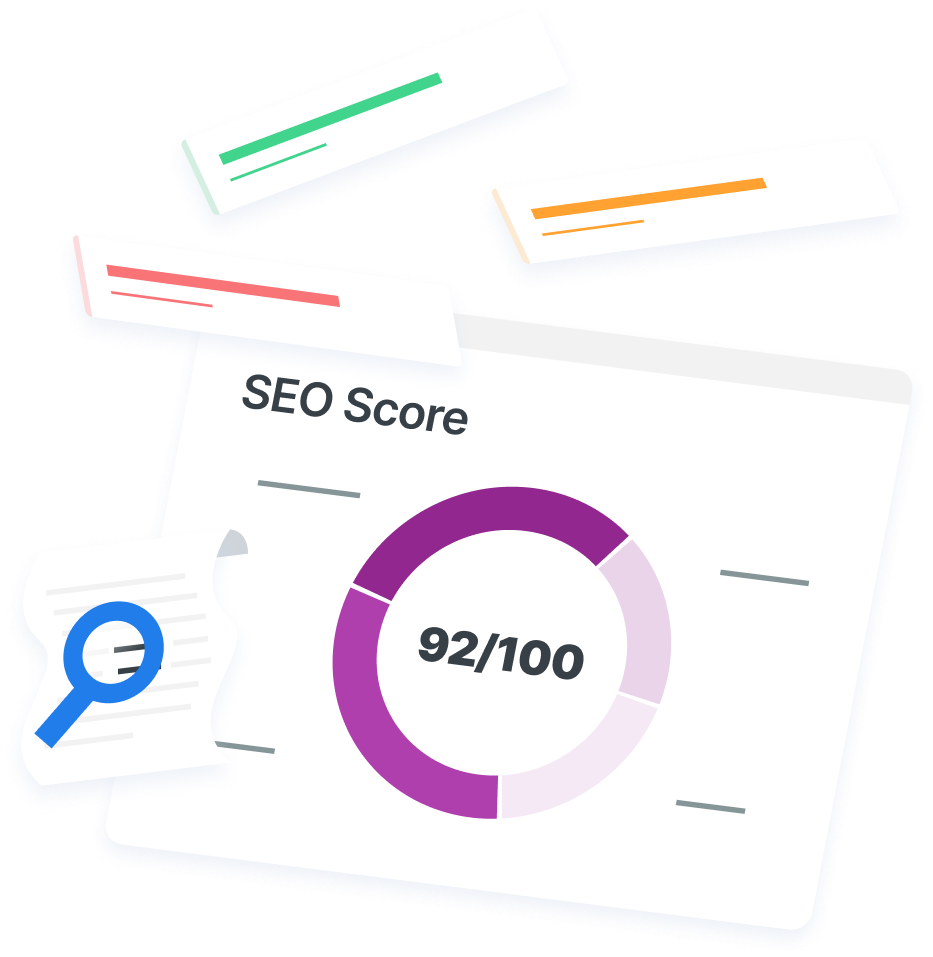
Table of Contents
- Question: What Are the Different Types of SEO?
- Question: Why Are Keywords Relevant to SEO?
- Question: What Are Long-tail Keywords?
- Question: What Does SERP Mean?
- Question: What Affects Your SEO Ranking?
- Question: What Are Inbound and Outbound Links?
- Question: What Are Title Tags and Meta Descriptions?
- Question: How Do You Create an SEO-friendly URL?
- Question: What’s the Difference Between White Hat SEO and Black Hat SEO?
- Got Any More Important SEO Questions?

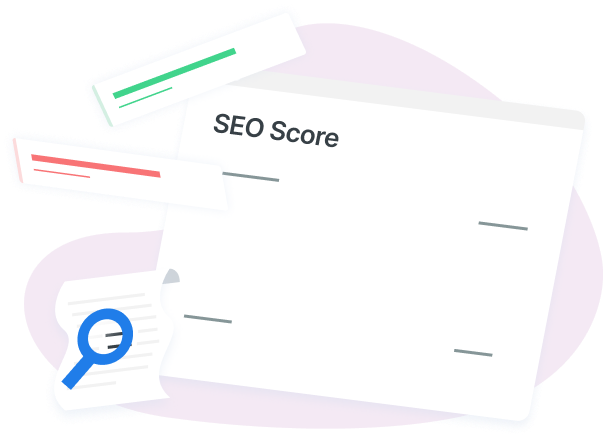
How Is Your Website’s SEO?
Use our free tool to get your score calculated in under 60 seconds.
Try our free SEO Checker
Boost your site’s search performance with our free SEO Checker. Analyze your website for optimization tips on titles, headers, content, speed, and more. Get a free report now to enhance rankings on Google, Bing, Yahoo, and beyond!






